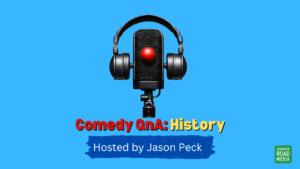I’ve been wanting to write about this subject for a while because I know humorists and corporate comedians who advocate clean humor and as a result can sometimes come across as being overzealous in their denouncement of blue humour. But what we all have to remember is that without some of the so-called dirty comedians, we wouldn’t have had the big comedic revolutions that we had throughout the 20th Century.
A lot of the clean comics I’ve spoken to criticize the blue, or dirty, comics because they use four-letter words and tell jokes on taboo subjects, such as sex. The consensus seems to be that using this type of humour leads to shock laughs, which somehow aren’t as valid as laughs borne out of clean humour.
Whilst this is absolutely true of a lot of open mike comedians, I’d have to argue that we’ve had the powerful creative minds of such dazzling comics as Lenny Bruce, Richard Pryor, Eddie Murphy, George Carlin, Chris Rock, Sam Kinison and Bill Hicks. Each one of these comedians used four letter words (in fact Carlin did a whole bit about words you can’t say on TV – Seven Dirty Words) and told sex jokes.
Each one in turn, I feel, has revolutionised live comedy and humour in their own way. Without the continual pushing of the profanity envelope by Lenny Bruce, all those comics that came after him would never have had half the freedom to talk about whatever they want. That said, I have seen open mike comedians whose act is based solely on blue material and if you removed all the dirty words there would be no act left! Therein lies the problem; more expletives than punchlines.
Whilst a lot of the firebrands of comedy that I’ve just mentioned have dirty material as the basis of their act, there is often a larger social or political point being made. Not only that but they are genuinely funny with that material, rather than being dirty for the sake of it.
A lot of the time their material lives within a wider context. They have something to say by being blue. But then again, you probably wouldn’t have hired a genius like Richard Pryor to speak after dinner for a governmental awards banquet. Performing in comedy clubs does allow you a certain amount of freedom to talk about whatever subjects you like; as long as you’re funny. A solution then could be as follows:
if you can develop an act which exists as purely clean, then you have the option to add dirty words if you play in the comedy club marketplace. But you have the freedom not to.
Take someone like Jerry Seinfeld. A brilliant, brilliant comedian when it comes to observing the minutiae of every day life. But clean as a whistle. The thing is, you’d never know. You’re too busy laughing your head off to notice. I saw him live at the London Palladium in 1998 and I think he used only one or two profanities in his whole show.
Some clean comics have also said that real success eludes dirty comics. It depends on your definition of success. I agree that, of the above mentioned comics, only Eddie Murphy has had a really successful movie career. The others didn’t quite successfully make the transition to movies or TV. They worked, and some of them still do work, better live. But that’s not to say that they aren’t successful.
This group of comics are still highly regarded and influential today even though (at time of writing) four of those six are no longer with us. For me personally, Richard Pryor, Chris Rock and Bill Hicks continually knock me sideways with their ability to make an audience laugh.
Pryor once did a bit about when he had a heart attack, what an extremely personal and honest routine it was. And it was very, very funny. It’s an important routine which allows us to see that it’s possible to take something so personal, find the universal themes and make it relevant to people who haven’t even had a heart attack. It’s still relevant today as it was back in 1975 when he did it.
Bill Hicks still influences my comedy today. Not because I use blue humour and rage against politics, far from it. I mainly work in the corporate market and I wouldn’t get much work if I upset and offended everybody. But I’m influenced by his ability to handle a crowd and squeeze laugh upon laugh out of a topic. He often gives a set-up and punchline and several more punchlines, or tag lines, on top of his original punchline.
Just as I’ve listed so-called dirty comics who have been revolutionary, I’ll also mention comics who have worked clean and achieved comedic revolutions all the same: Jerry Seinfeld, Steve Martin, Woody Allen, Bill Cosby… to name but a few.
What do I personally think is better?
Well, a lot of that depends on your sense of humour and how you already make people laugh. But also, it really depends on the markets that you want to work in. If you solely want to work in the comedy club market then be clean, be blue it doesn’t matter as much. But most other markets, such as the corporate market or the Christian markets, then squeaky clean is the only way to go. Even if your contact at the corporate function says: “don’t worry you can make it blue for us”.
Even if you get that seal of approval, you’re bound to offend someone. I’ve met too many audiences members who have seen comedians perform at their awards ceremonies only to have the comic “go off message”. There’s a danger that they might not be asked back. Remember; no show, no dough.
If you work blue in a comedy club remember that you can also turn your audiences off unless you’re genuinely funny. I’ve seen open mike comics do a set and have people audibly go: “eeeyeeew” in disgust, where they should be laughing. A lot of new comics think that they have to be radical and talk about topics that have never been talked about before.
I think the thing to focus on is being funny. Radical and new topics are all well and good, but if you’re not generating big laughs (for a comedian 4-6 laughs per minute; for a speaker 45 seconds of laughter cumulatively per 5 minutes) then you’re not doing your job.
What I firmly believe is that all of us laughtermakers, whether blue or clean, should advocate the view of “ours is not the only way, ours is just another way”.



